November
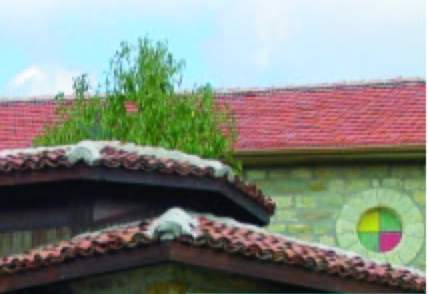
The ninth month of the year was called by the Romans November, proto-Bulgarians called it Month of the monkey, Slavs gave it the name “the cold month”, and today’s Bulgarians call it Rangel’s month. The forty days between St. Demetrius’ Day and St. Nicholas Day are called Poor man’s summer.
1 November GOLYAMA ZADOUSHNITZA (Great All Souls’ Day)
The great or also called Michaelmas All
Souls’ Day is the first Saturday before
Michaelmas. It is not only the last for the year
but also the biggest. For the treat at the
graveyard people bring seven different meals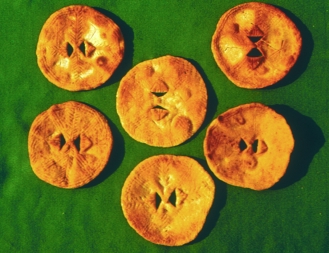
so as to “hear” the blessing of the dead during
the coming Christmas fast.
Particular importance at Great All Souls’
Day is given to the canonical church ritual
and the smoking of incense. It is commonly
believed that “the devil fears incense”.
Candles are lighted on the graves of the dead
so that memory does not die in the soul of
the living, that the ashes of forgetfulness do
not cover it. Water and wine are poured on
the grave. In the ancient commemoration tradition
of the Bulgarians the grave is considered
a territory of the dead and a place
where contact with the living is achieved.
The ritual pouring is a way of keeping the
“life” of the dead person in “the other worl”
by satisfying his needs for food, wine and
water. Pouring wine on the grave on that day is usually done by the oldest
woman present at
the memorial service. She takes the vessel with wine and starting from
the place where
the head is she makes three circles to the left along the periphery of
the grave. She makes
the sign of the cross three times and only then she breaks the ritual
bread. All gather
round the meal leaving an empty place for the deceased. Everybody puts
the first
morsel on the ground and pours some of the wine, saying: “God bring
peace to his soul!”
It is believed that at each memorial service the soul eats to the full
and the relatives try
to prepare the dishes, which the dead person liked best when he was alive.
In some villages
people give as gifts new clothes to people who had participated in the
burial. If during
the memorial service a butterfly or a small fly flies over the meals,
people believe the
soul of the deceased is among them – visible but untouchable.
8 November ARHANGELOVDEN
(Michaelmas)
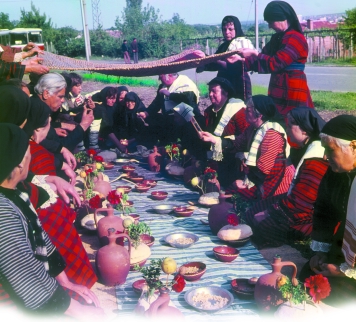 In
the folk mythology of the Bulgarians
In
the folk mythology of the Bulgarians
Rangel is one of the six brothers who divided
the world among themselves. He
received the land of the dead. So in folk
terms he is called “Rangel – the soul-reaper”.
The folk conception of Archangel Michael
attributes to him justness and compassion,
the only defender of the soul of the deceased
before God. When the dying person is smiling
it means that Archangel Michael is handing
a gold apple to take his soul, old people
in Western Bulgaria say. The dying person
suffers a lot when the saint is late. So a person
who respects the holiday will die quickly
and easily.
On Michaelmas each family kills a ram or
an ewe to respect the dead. The poor on this
day bought small quantities of mutton, four
legs and a ram head. The head and the legs are first singed on an open
fire and then boiled as they are.
For that day the woman of the house makes a special ritual bread –
Rangel’s bread,
cut in five places and richly decorated with figures of dough. In some
villages this bread
is called “kolak”. Sitting round the festive table the oldest
man breaks the bread like a cross, pours wine
on it with a clay bowl, and the hostess collects this wine with cupped
hands and sprinkles
it round the house, pronouncing the blessing: “Saint Archangel,
Saint Nicholas and all saints, help us. We pay homage to you and cut the
bread like a cross so that wheat grows up to the waist! This year what
we could, and next year what we want! Now with a bowl, next year with
the kettle!”Then
she breaks the bread and gives everybody a piece of it. The piece is taken
with both hands and a blessing is said: “As much wheat in the piece
of bread so much heaps of wheat and health in the house! Amen!”
The nameday of Angel, Angelina, Mihael, Mihaela, Raicho, Raina, Rangel.
11 November. Nameday of Viktor, Viktoria (meaning ‘victor’)
and Mincho, Minka (after the
name of Saint Mina).
13 November KOLEDNI ZAGOVEZNI (Christmas Shrovetide)
After the Great All Souls’ Day and Michaelmas there comes Christmas
Shrovetide. This is the name of the day before fast begins. The last day
when you can
eat meat. People kill a big hen and cook it with sauerkraut. Also stuffed
peppers with beans
and much oil. The women prepare a winded banitsa with pumpkin and lots
of walnuts –
tikvenik. After dinner the woman of the house washes and hides the big
wooden
spoon that was used to serve the meat dishes. It will not be touched for
45 days, till
Christmas, when you “break fast". For “breaking fast”
people prepare since
St. Nicholas’ Day. The man of the house catches several sparrows,
the woman puts
them in hot water, takes off the feathers and adds salt. Then she puts
them on a string of
hemp, hangs it in a cold place under the roof to dry. For Christmas the
sparrows become
dry like dried mackerel. On coming back from church, the woman of the
house breaks
the string and gives a piece of the dried birds to all members of the
family. To the girls she
gives the wings and to the boys the drumsticks "to get dirty",
after which they can sit at
the table and eat of the meat dishes.
14 November MRATINYAK
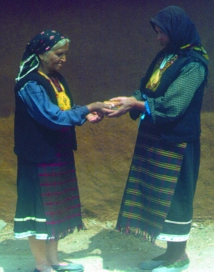 as
a blood offering to appease the Martinyak.
as
a blood offering to appease the Martinyak.
In the patriarchal Bulgarian family a woman
never kills an animal. But on this day the oldest
woman in the house takes the knife,
holds the rooster and assisted by another
woman kills it over the threshold but in such
a way that its head falls inside. She says “We
are not killing you, Martinyak is killing you.”
The woman ties the head and the legs with a
red thread and hangs them by the fireplace.
In the bill of the rooster she has put a live
coal. In this way the house is protected from
evil eyes, ghosts and spirits. The gizzard is
hidden by the chimney and used to treat
children who wet their beds. They take some
of the half-digested food and put it in "silent" water and give
it to the sick child to take
three sips. The gall of the chicken has a healing effect. It is used to
heal all diseases and
break magic. According to old people from the town of Yambol, the feathers
also have a
healing effect. They are used against dizziness, fainting and nose-bleeding.
In folk mythology Martinyak is an evil, black ghost with feathers and
big green eyes,
who kills the hens. Every housewife on this day must kill a black rooster
on the threshold
14–21 November VALCHI PRAZNITZI (Wolf Days)
(Mratintzi) Brer Wolf, Brer Wolf,
Let your name be blessed,
That you gave as a present…
(folk song)
In the past the Thracians paid homage to the wolf as a leader of a military
band but a
warrior who has broken the rules and has become a leader-king but of rascals.
Something sunny has remained in it, something royal, although with a negative
sign.
His name is borne by people, places and villages. Everything comes from
mythology,
from the beliefs of our ancestors. The merged motif of the wolf-dragon
is clearly shown in
the art of that time. Dragons are represented with wolf heads in pieces
of jewelry, woodcarvings
and embroidery. Bulgarians believe that these are evil nights in which
a man can catch all sorts of
diseases. An old and ugly woman writes down in a book the sinners and
makes them
die with a touch of her stick. “Late at night people don’t
go out of their houses.”
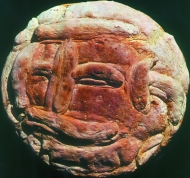 21
November KOUTZOULAN
21
November KOUTZOULAN
This is the day of the most terrible lame
wolf, who ate people. On this day you must
not take a comb in your hand, men don’t put
on new shirts, women don’t wash clothes,
don’t sew, don’t knit. Even the bread is not
cut with a knife but is broken with hands.
23 November. Nameday of Alexander, Alexandra (from Old Greek, meaning ‘protector of men’).
24 November KATERININDEN (St. Catherine’s Day)
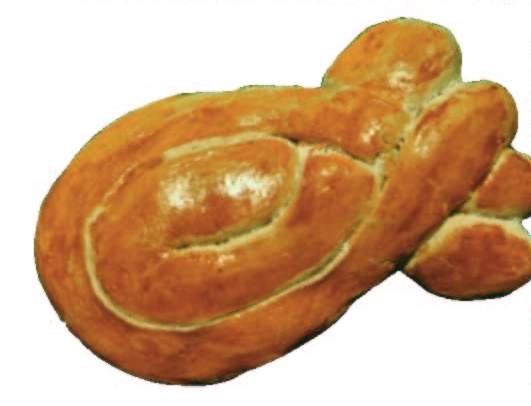 The
holiday of Saint Martyr Catherine is
The
holiday of Saint Martyr Catherine is
called Catherine’s Day in Bulgaria. People
pay homage to this saint for her abilities to
cure rabbis and measles.
Early in the morning the woman of the
house, who must be ritually clean (i.e. not in
her monthly period), kneads 5, 7, or 9
breads of wheat with “silent” water and decorates
them with the spindle. Then she covers
them with molasses, treacle or honey and
gives them out to neighbors. If there are
small children in the house, she takes two
breads, stands at a crossroad and gives every
passer-by a piece, saying: “Here, take some
for Saint Catherine, so she stays by our home
and protects us from Measles and Rabbis!” Each one must take a piece
and, after
making the sign of the cross three times, say: “Thank you, woman,
for the sweet
bread. As my fingers are sticky let health stick to your children!”
“Amen! God bless
us!”, the woman replies and watches that the pieces of bread are
finished with an odd
number of passers-by so the diseases be banished. And people believed
that in a house
where such pieces of bread are given out no measles and rabbis will enter.
Wonderful
songs were created for St. Catherine’s Day in which they praised
the goodness and the
heavenly beauty of young Catherine: …Catherine is known, to the
king and
the vezir, for she is a dazzling beauty, a beauty, not seen before…
The nameday of Ekaterina, Katya.
30 November ANDREEVDEN (St. Andrew’s Day)
(Edrei)
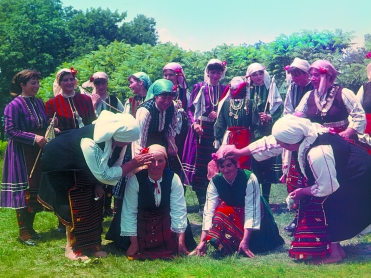 Bulgarians
call it “Bear’s Day”. And legends
Bulgarians
call it “Bear’s Day”. And legends
tell that:
Once upon a time, long time ago, in a
family with a small girl the woman died. The
father married another one who also had a
girl. But the step-mother loved her child
more and made the step-child do all the
housework. And she was never satisfied.
Once, when it was very cold, she gave
the step-child black wool and told her to
wash it till it becomes white. “Or else, don’t
return home!”, said the step-mother. The
small girl put the wool on its shoulder and
went to the river. She began washing but…
the black wool did not become white. Frozen
all over the child sat on the bank and cried. Immediately an old man with
a white beard
appeared in front of her. “Why are you crying, little girl?”,
asked the old man gently. The girl told him everything and the good man
added: “Put the wool on your shoulder, go back home and don’t
be afraid.” Then suddenly he disappeared.
The child went home, knocked on the closed door for a long time and when
the evil step-mother opened the door she was struck – in front of
her a golden girl was standing and shining like the sun itself. She became
even more angry when she under-stood
how the child turned golden and decided to send her child as well so it
becomes golden. She dressed it well, gave it wool and sent it to the river.
The little girl quickly reached the river, threw away the wool for she
had no intention
to wash it and sat on the bank. She waited and waited but nobody came.
She was all frozen and started crying. In a moment the man with the white
beard appeared. “Why are you crying, little girl?”, the old
man asked. “I’m waiting for you, old man,” the
girl retorted with a rude voice, “I want you to make me gold and
go back home.” “All right, my girl, put the wool on your shoulder
and go back home,” the old man said and disappeared. The girl grabbed
the wool and ran home. The step-mother, on hearing her
steps, quickly opened the door but closed it on the moment for in front
of her was standing a big black bear. The old man punished the evil step-mother
by turning her child into a bear. From that day on people tell stories
about bears. With the first rays of the sun the oldest woman in the house
takes boiled corn with a wooden spoon, throws the beans into the chimney
and says: “Here is for you, bear, boiled corn for not to eat it
raw!” And people believe that “bears won’t walk in the
fields and won’t do harm to the people”. From Edrei the day
begins to grow, “by as much as a grain of rye”. The nameday
of Adriana, Andrey (‘masculine’).